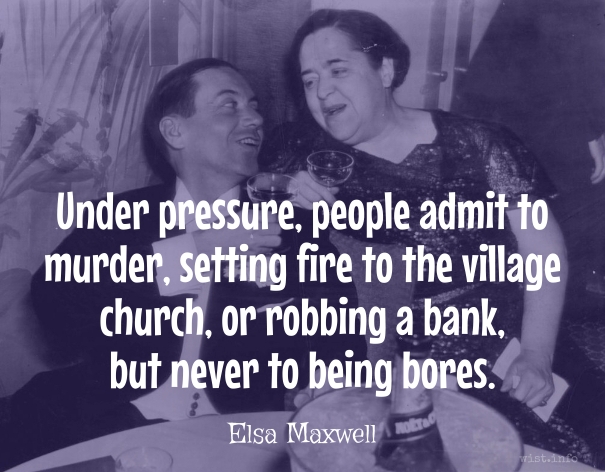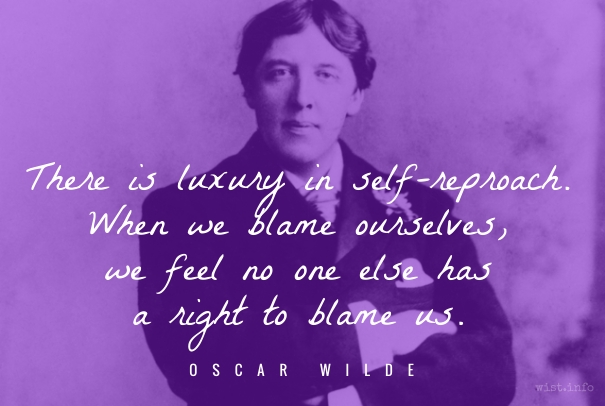There is a sort of man who pays no attention to his good actions, but is tormented by his bad ones. This is the type that most often writes about himself.
W. Somerset Maugham (1874-1965) English novelist and playwright [William Somerset Maugham]
The Summing Up, ch. 4 (1938)
(Source)
Quotations about:
self-criticism
Note not all quotations have been tagged, so Search may find additional quotes on this topic.
Incline us oh God! to think humbly of ourselves, to be severe only in the examination of our own conduct, to consider our fellow-creatures with kindness, and to judge of all they say and do with that charity which we would desire from them ourselves.
Jane Austen (1775-1817) English author
Prayer 3 “Another Day Now Gone”
(Source)
On e of three surviving prayers Austen wrote. More discussion: Exploring Jane Austen’s Prayers | Jane Austen's World.
About one-half the discumfert ov this life iz the result ov gitting tired ov ourselfs.
[About one-half the discomfort of this life is the result of getting tired of ourselves.]
Josh Billings (1818-1885) American humorist, aphorist [pseud. of Henry Wheeler Shaw]
Everybody’s Friend, Or; Josh Billing’s Encyclopedia and Proverbial Philosophy of Wit and Humor, ch. 132 “Affurisms: Chips” (1874)
(Source)
O clear and noble conscience, how sharply a little fault stings you!
[O dignitosa coscïenza, e netta,
come t’è picciol fallo amaro morso!]Dante Alighieri (1265-1321) Italian poet
The Divine Comedy [Divina Commedia], Book 2 “Purgatorio,” Canto 3, l. 8ff (3.8-9) (1314) [tr. Kline (2002)]
(Source)
Observing his guide, Virgil, upset over one of his own lapses.
(Source (Italian)). Alternate translations:O matchless dignity of stainless thought!
Thus bitter seems to you the taste of Sin!
[tr. Boyd (1802), st. 2]O clear conscience and upright
How doth a little sting wound thee sore!
[tr. Cary (1814)]Oh, dignity of conscience, when complete,
How small will bitter make that once was sweet!
[tr. Bannerman (1850)]O noble conscience, and without a stain,
How sharp a sting is trivial fault to thee!
[tr. Longfellow (1867)]O conscience, dignified and pure, how bitter a sting is a small fault to thee!
[tr. Butler (1885)]O conscience honourably pure, to thee
How is a little fault most bitterly shrived!
[tr. Minchin (1885)]O conscience, upright and stainless, how bitter a sting to thee is little fault!
[tr. Norton (1892)]O noble conscience and clear, how sharp a sting gives a little fault to thee!
[tr. Wicksteed (1899)]O pure and noble conscience, how bitter a sting to thee is a little fault!
[tr. Sinclair (1939)]O honourable conscience, clear and chaste,
How small a fault stings thee to bitter smart!
[tr. Binyon (1943)]O noble conscience, clear and undefaced,
How keen thy self-reproach for one small slip!
[tr. Sayers (1955)]O noble conscience without stain! how sharp
the sting of a small fault is to your sense!
[tr. Ciardi (1961)]O pure and noble conscience, how bitter
a sting is a little fault to you!
[tr. Singleton (1973)]O dignity of conscience, noble, chaste,
how one slight fault can sting you into shame!
[tr. Musa (1981)]O conscience so precious and so clear,
How small a fault is a sharp tooth to you!
[tr. Sisson (1981)]O pure and noble conscience, you in whom
each petty fault becomes a harsh rebuke!
[tr. Mandelbaum (1982)]O worthy clear conscience, how bitter a bite to you is even a little fault!
[tr. Durling (2003)]Such dignity of conscience, clear and clean,
bitten so keenly by so slight a fault!
[tr. Kirkpatrick (2007)]O pure and noble conscience,
how bitter is the sting of your least fault!
[tr. Hollander/Hollander (2007)]But O, how purest consciences are stung
By tiny faults, bitter on noble tongues!
[tr. Raffel (2010)]
The way to achieve happiness is to have a high standard for yourself and a medium one for everyone else.
Marcelene Cox (1900-1998) American writer, columnist, aphorist
“Ask Any Woman” column, Ladies’ Home Journal (1954-08)
(Source)
Education is more than information, or skill, or propaganda. In each age education must take into account the conditions of that age. But the educated mind is not a mere creature of its own time. Education is emancipation from herd opinion, self-mastery, capacity for self-criticism, suspended judgment, and urbanity.
Everett Dean Martin (1880-1941) American educator, minister, writer, lecturer
The Meaning of a Liberal Education, Preface (1926)
(Source)
Don’t worry about not being recognized by others; worry about not having any reason for them to recognize you.
[不患人之不己知、患其不能也]
Confucius (c. 551- c. 479 BC) Chinese philosopher, sage, politician [孔夫子 (Kǒng Fūzǐ, K'ung Fu-tzu, K'ung Fu Tse), 孔子 (Kǒngzǐ, Chungni), 孔丘 (Kǒng Qiū, K'ung Ch'iu)]
The Analects [論語, 论语, Lúnyǔ], Book 14, verse 30 (14.30) (6th C. BC – AD 3rd C.) [tr. Ames/Rosemont (1998)]
(Source)
(Source (Chinese)). Originally numbered by Legge as 14.32, but identified in modern translations as 14.30; the distinction is noted below. See also 1.16, 4.14, 15.19. Alternate translations:I will not be concerned at men's not knowing me; I will be concerned at my own want of ability.
[tr. Legge (1861), 14.32]My great concern is, not that men do not know me, but that they cannot.
[tr. Jennings (1895), 14.32; Jennings notes the unclear phrase could also mean "but that here is want of ability (in me to know them)."]Be not concerned that men do not know you =; be concerned that you have no ability.
[tr. Ku Hung-Ming (1898), 14.32](A wise man) is not distressed that people do not know him, he is distressed at his own lack of ability.
[tr. Soothill (1910), 14.32]Not worried that others don't know me, worried by my incapacities.
[tr. Pound (1933), 14.32](A gentleman) does not grieve that people do not recognize his merits; he grieves at his own incapacities.
[tr. Waley (1938), 14.32]Be not concerned over men’s not knowing of you; be concerned rather over your inabilities.
[tr. Ware (1950)]It is not the failure of others to appreciate your abilities that should trouble you, but rather your own lack of them.
[tr. Lau (1979), 14.30]One does not worry about the fact that other people do not appreciate one. One worries about the fact that one is incapable.
[tr. Dawson (1993), 14.30]It is not your obscurity that should distress you, but your incompetence.
[tr. Leys (1997), 14.30]Do not worry about men not knowing you; rather, worry about your incapability.
[tr. Huang (1997), 14.30]I do not worry about that others do not understand me, just worry about that i have no talent.
[tr. Cai/Yu (1998), 14.30, #370]He does not worry about others not knowing him; he worries about whether he is capable.
[tr. Brooks/Brooks (1998), 14:30; they consider this a later interpolation, with 4:14 being the actual Confucian saying.]Don't grieve when people fail to recognize your ability. Grieve for your lack of ability instead.
[tr. Hinton (1998), 14.30]Do not worry that you are not recognized by others; worry rather that you yourself lack ability.
[tr. Slingerland (2003), 14.30]Don’t worry about others’ not understanding you. Worry about your own lack of ability.
[tr. Watson (2007), 14.30]Do not worry that other people do not know you. Be concerned about your own lack of ability.
[tr. Chin (2014), 14.30]I am not concerned with not being known by others. I am concerned with my lack of ability.
[tr. Li (2020), 14.30]
There is something which makes it more agreeable to condemn ourselves than to be condemned by others.
Abigail Adams (1744-1818) American correspondent, First Lady (1797-1801)
Letter to John Adams (19-20 Apr 1764)
(Source)
One of the sure signs of maturity is the ability to rise to the point of self criticism.
Martin Luther King, Jr. (1929-1968) American clergyman, civil rights leader, social activist, preacher
“The Rising Tide of Racial Consciousness,” Speech, National Urban League, New York (6 Sep 1960)
(Source)
The dramatic art is particularly satisfying for any writer with a polemical bent; and I am at heart a propagandist, a tremendous hater, a tiresome nag, complacently positive that there is no human problem which could not be solved if people would simply do as I advise.
Gore Vidal (1925-2012) American novelist, dramatist, critic
Visit to a Small Planet and Other Television Plays, Preface (1956)
(Source)
There is luxury in self-reproach. When we blame ourselves, we feel no one else has a right to blame us. It is the confession, not the priest, that gives us absolution.
Oscar Wilde (1854-1900) Irish poet, wit, dramatist
The Picture of Dorian Gray, ch. 8 (1891)
(Source)
Would you have a friend who talks to you the way you talk to yourself?
Carolyn Ann "Callie" Khouri (b. 1957) American screenwriter, producer, director, feminist
Commencement Address, Sweet Briar College (22 May 1994)
(Source)
Neither praise, nor dispraise thy self; thy Actions will do it enough.
Thomas Fuller (1654-1734) English physician, preacher, aphorist, writer
Introductio ad Prudentiam, Vol. 1, # 338 (1725)
(Source)
In my head there is a permanent opposition-party; and whenever I take any step or come to any decision — though I may have given the matter mature consideration — it afterward attacks what I have done, without, however, being each time necessarily in the right. This is, I suppose, only a form of rectification on the part of the spirit of scrutiny; but it often reproaches me when I do not deserve it.
[In meinem Kopfe giebt es eine stehende Oppositionspartei, die gegen Alles, was ich, wenn auch mit reiflicher Überlegung, gethan, oder beschlossen habe, nachträglich polemisirt, ohne jedoch darum jedesmal Recht zu haben. Sie ist wohl nur eine Form des berichtigenden Prüfungsgeistes, macht mir aber oft unverdiente Vorwürfe.]
Arthur Schopenhauer (1788-1860) German philosopher
Parerga and Paralipomena, Vol. 2, ch. 26 “Psychological Observations [Psychologische Bemerkungen],” § 345 (1851) [tr. Saunders (1890)]
(Source)
(Source (German)). Alternate translation:There is in my mind a standing opposition party which subsequently attacks everything I have done or decided, even after mature consideration, yet without its always being right on that account. It is, I suppose, only a form of the corrective spirit of investigation; but it often casts an unmerited slur on me.
[tr. Payne (1974)]
Half myself mocks the other half.
Joseph Joubert (1754-1824) French moralist, philosopher, essayist, poet
Pensées [Thoughts], 1813 entry [tr. Auster (1983)]
(Source)
I could not find an analog in other translations of the Pensées.
The best authors are always the severest critics of their own works; they revise, correct, file, and polish them, till they think they have brought them to perfection.
Lord Chesterfield (1694-1773) English statesman, wit [Philip Dormer Stanhope]
Letter to his son, #253 (6 May 1751)
(Source)
But how shall we expect charity towards others, when we are uncharitable to our selves? Charity begins at home, is the voyce of the world, yet is every man his greatest enemy, and as it were, his owne executioner.
Thomas Browne (1605-1682) English physician and author
Religio Medici, Part 2, sec. 4 (1643)
(Source)






















